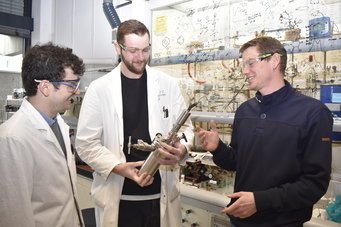
An illustration depicts two women in discussion. Larger image. Illustration by klyaksun/stock.adobe.com.
AMES, Iowa – Iowa offers a successful model for serving youth exiting foster care, according to a new study.
Lead author Carl Weems is a professor and chair of human development and family studies at Iowa State University. He researches the risks and effects of trauma, along with prevention and interventions to bolster resilience.
“Youth are typically in foster care for what most people would consider a traumatic experience, such as being taken out of their home for abuse or neglect, or the death of parents,” said Weems.
Research shows these and other traumatic and adverse childhood experiences put youth at higher risk of early pregnancy or parenthood, homelessness, unemployment, poverty, mental health issues and substance abuse, explains Weems. Young adults exiting foster care are also less likely to have a safety net and financial support from family, adding to the challenges in the transition to adulthood.
Aftercare services aim to reduce risks and support these 18 to 21-year-olds as they become self-sufficient. YSS coordinates the Iowa Aftercare Services Network with eight other nonprofit organizations.
Participants who voluntarily enroll in the program meet with advocates to reach personal goals for education, employment, housing, health, life skills and relationships. They also receive financial assistance for housing, continuing education and job training.
Lessons from Iowa model
YSS now works with researchers at Iowa State to monitor services and evaluate the Iowa Aftercare Services Network each year. Weems explains the newly published study draws from five years of participant survey responses, as well as employment and education data to understand trends. The study also offers insights for researchers and professionals in children and youth services beyond Iowa.
“All this data is here, and the field more broadly doesn’t realize that the model in Iowa is working well. So, I thought, let’s put several years of this data together into a paper to help the rest of the world think about how to help these kids,” said Weems.
Among the findings:
- Most youth in foster care enroll in the Iowa Aftercare Services Network shortly after they turn 18 and engage in the program over 2.5 years on average.
- The program recruits a representative sample of participants across race and ethnicity but participation is relatively higher for women and lower for men and those involved in the justice system.
- Participants reported high satisfaction with the services and high self-sufficiency in housing, finances and relationships.
- Rates of employment and education are relatively high compared to national estimates, and rates were greater when exiting the program compared to starting the program.
“The study is a first step in showing that Iowa has a really good model for providing these aftercare services, broadly, and they’re meeting many of the challenges. This research has identified some areas that could help improve services for kids exiting foster care,” said Weems.
The researchers found self-reported substance abuse fell from 27% in 2020 to 17% in 2022, but only 3-4% of participants said they received treatment. During the same time span, nearly half of the participants reported a mental health diagnosis, but less than one-third said they were receiving counseling or therapy.
Weems and his co-authors recommend expanding mental health and substance abuse assessment and services for this population nationally. They say incorporating more standardized screeners – similar to what patients fill out before a medical appointment – could flag early signs of depression, anxiety and problems with drugs and alcohol. From there, advocates could recommend options for care.
Since men were less likely to enroll in aftercare, the researchers also recommend targeted marketing and recruiting efforts.
Janet Melby, senior programs manager for human development and family studies; Carol Behrer, former executive director of the Youth Policy Institute of Iowa; Doug Wolfe, program planner with the Iowa Department of Health and Human Services; and Mikaela D. Scozzafava, a graduate student at Iowa State, contributed to the study.







